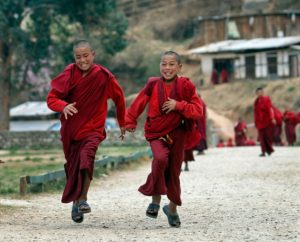What would you do differently if you knew this was your last year on earth?
Paradoxically, the mediation by Budhhist monks on death is intended as a key to better living. Becoming aware of the transitory nature of our physical lives stimulates a realignment between momentary desires and existential goals. It makes one ask, “Am I making the right use of my scarce and precious life?”
Karma Ura, the director for the Center of Bhutan Studies, advises that we should think about death for five minutes every day as a cure for anxiety. In Bhutanese culture, one is expected to think about death five times a day, which might be considered particularly remarkable for a nation so closely equated with happiness.
The wisdom here is that death is a part of life, whether we like it or not, and ignoring this essential truth comes with a heavy psychological cost.
Indeed, Linda Leaming, author of the wonderful book A Field Guide to Happiness: What I Learned in Bhutan About Living, Loving and Waking Up¸ knows this too.“I realised thinking about death doesn’t depress me. It makes me seize the moment and see things I might not ordinarily see,” she wrote. “My best advice: go there. Think the unthinkable, the thing that scares you to think about several times a day.”
We can practice some of the Buddha’s wisdom by resolving to live as if 2018 was our last year. Then by pruning out activities, large and small, that don’t pass the “last-year test.” We might consider whether a last vacation should be a soul-seeking trip to the mountains or shore or a party-filled ski or beach trip. If it was my last year, would I spend more time endlessly checking social media posts or spending time with those I love?
Whether we choose to think about death every day, considerately choosing the way we spend the gift of time in our scarce and precious lives will undoubtedly come with the benefit of both appreciating the moments and reducing anxiety. Om.

